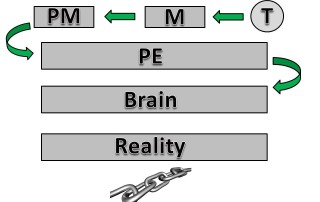The following is a very brief excerpt from my book, “This is Not That” due to be completed in 2048, based on the current pace. Let me know what you think. “In a rather complicated study, Professor D.B. Fenker and his colleagues (2005) had subjects view a series of emotionally neutral words on a computer screen. Randomly, some words were preceded by pictures of fearful faces or other disturbing images. The exposure to these images, however, was so quick that the individual was not aware that they had even seen the image, referred to popularly as subliminal images. Participants were later shown lists of words and asked to say whether they recalled seeing a word (had a conscious memory of learning it) or knew they had seen the word (they knew they had seen it before but couldn’t remember where or when). The researchers found that when words were preceded by a frightening or unpleasant image, they were more accurately recognized, though not consciously recalled. The implications of this study, and others like it, are momentous. If the brain is so sensitive to negative stimulation as to react in such a powerful way to such an insignificant trigger, imagine its […]
Perspective: The Gatekeeper
Often we are hard on ourselves when we don’t need to be, particularly when it comes to how much things that have happened to us continue to affect us. We like to think that we can just let things go, move on, and get over it but that’s just not how things actually work. Our past experiences continue to affect our current perception of events unless we actively try to overcome this natural tendency. Similarly, it is very difficult for a tall building to stand straight when the foundation is crooked. The only way to straighten the building is to work on the foundation, not the 30th floor. Often, when discussing current struggles with my clients, they will remark that they feel a lot of anxiety or depressed feelings “for absolutely no reason”. This is rarely the case. It is more accurate to say that they are feeling anxiety for no known reason, or no current reason. There’s always a reason. One way that is helpful for people to unlock the true impact of the past on their present is to get them to see it from outside of themselves. No, this does not involve high doses of hallucinogenic mushrooms, […]
Why Watching the News is Bad for Your Brain
It is a well-established fact that sex sells. When it comes to the news, however, sex is joined by violence, sickness, political unrest, and lawsuits. Anyone who watches or reads the news is aware that the information that is fed to us is overwhelmingly negative. It is so much so that that some news shows have specifically set aside time in their programming to focus on a positive story. However, even those positive stories are framed by negativity, as it usually involves someone rising above unfortunate circumstances such as violence, sickness, or unjust social circumstances. There are many reasons for this attraction to negativity. We can’t just blame the media organizations, since they only feed us what we want to eat. We may be more drawn to negativity because our primitive threat detecting system in the limbic portion of the brain is wired to be on the lookout for threats at all times. As I often say to my clients, if we are living in the jungle and forget to stop and smell the roses, the consequences are much less severe than if we forget which snakes are poisonous. We are wired to be wary. However, in our day and […]
Playing Dead Emotionally: How Numbing Your Pain Can Be a Curse (and a Blessing)
Fight, Flight and … Freeze? Most people have heard of the “fight or flight” response. It is the body’s naturally hard-wired way of dealing with threats to one’s safety. I have written about it before, a few times, so I won’t go into it again but today I’m going to mention the third part of this response: freeze. In nature, animals typically go to flight first, since they are free of ego and have nothing to prove, only to enhance their own chances of survival. If they can’t go to flight and escape danger, they will go to fight, posturing and growling in hopes of scaring off the threat. If this fails, they will actually engage in aggressive behavior, albeit defensive aggression. Once these two options are unsuccessful, or if they are unavailable, most species have a form of reflexive behavior that could be termed “playing dead”. Playing Dead Emotionally Since most of the threats people face in our neck of the woods are social or emotional (although many do face actual physical threats in many forms), the freeze response may look a bit different than it does for a possum or cat. In our case, we tend to play […]











Recent Comments